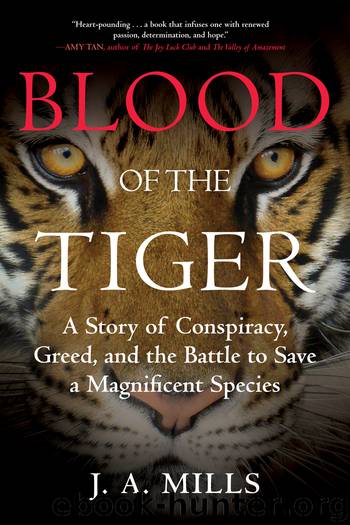Blood of the Tiger: A Story of Conspiracy, Greed, and the Battle to Save a Magnificent Species by J. A. Mills

Author:J. A. Mills [Mills, J. A.]
Language: eng
Format: epub
Tags: Non-Fiction, Science
ISBN: 9780807074978
Google: EvcCBAAAQBAJ
Amazon: B00LRHUHAS
Barnesnoble: B00LRHUHAS
Goodreads: 22715363
Publisher: Beacon Press
Published: 2014-11-04T00:00:00+00:00
Tiger farming has proven to be a divisive issue and one that has distracted many in the conservation community from the common goal of saving wild tigers. . . . There are clever theories that tell us that tiger farming . . . is the panacea for conservation. But there are an equal number of experts . . . who inform us otherwise. . . . There are several unknowns and even more unknowables that no amount of research can cast light upon. Will legalized farming facilitate laundering? Would it create new markets and an even higher demand for wild tiger products for those who want a luxury good—the “real thing,” the organic tigers? And why, if farming is so effective, are wild bears still poached when there is a surplus of farmed bear bile in the world? The truth is that we cannot provide answers to these counterfactuals that can only be known after the fact. And this is why we need to exercise caution. Extinction is irreversible, so prudence and precaution suggest that the risks of legalized farming of tigers for their parts and derivatives are too great a gamble for the world to take. Having carefully weighed the economic arguments, we urge the CITES community to uphold the ban on wild tiger products and for all countries to continue to ban the domestic trade of wild tigers or any commercial exploitation. This is the only safe way to ensure that wild tigers may have a future tomorrow.
The Dragon, speaking for China, opposed the request for reporting on tiger farms because the only official mandate of CITES was to regulate international wildlife trade.
John Sellar, speaking for the CITES Secretariat, said that China was “technically correct” but member countries had agreed by consensus that tigers should not be farmed because farming stimulated demand for tiger parts and products from all sources, including critically endangered wild tigers.
In the end, the Standing Committee agreed to require reporting within ninety days, and I sent Keshav’s statement in an e-mail to the ITC with the subject line “Victory for Tigers!” “The Bank’s decision to announce its opposition to tiger farming in a UN forum, in the presence of a large delegation from China, may well be a game-changer,” I said.
Three months later, tiger specialist Dale Miquelle reported that the Russian Far East had lost up to 40 percent of its wild tigers to poachers.19
Download
This site does not store any files on its server. We only index and link to content provided by other sites. Please contact the content providers to delete copyright contents if any and email us, we'll remove relevant links or contents immediately.
Sapiens: A Brief History of Humankind by Yuval Noah Harari(13053)
The Tidewater Tales by John Barth(12030)
Do No Harm Stories of Life, Death and Brain Surgery by Henry Marsh(6336)
Mastermind: How to Think Like Sherlock Holmes by Maria Konnikova(6236)
The Thirst by Nesbo Jo(5785)
Why We Sleep: Unlocking the Power of Sleep and Dreams by Matthew Walker(5642)
Sapiens by Yuval Noah Harari(4537)
Life 3.0: Being Human in the Age of Artificial Intelligence by Tegmark Max(4508)
The Longevity Diet by Valter Longo(4445)
The Rules Do Not Apply by Ariel Levy(3906)
The Immortal Life of Henrietta Lacks by Rebecca Skloot(3826)
The Body: A Guide for Occupants by Bill Bryson(3802)
Why We Sleep by Matthew Walker(3773)
Animal Frequency by Melissa Alvarez(3755)
Yoga Anatomy by Kaminoff Leslie(3701)
Barron's AP Biology by Goldberg M.S. Deborah T(3632)
The Hacking of the American Mind by Robert H. Lustig(3580)
All Creatures Great and Small by James Herriot(3516)
Yoga Anatomy by Leslie Kaminoff & Amy Matthews(3396)
